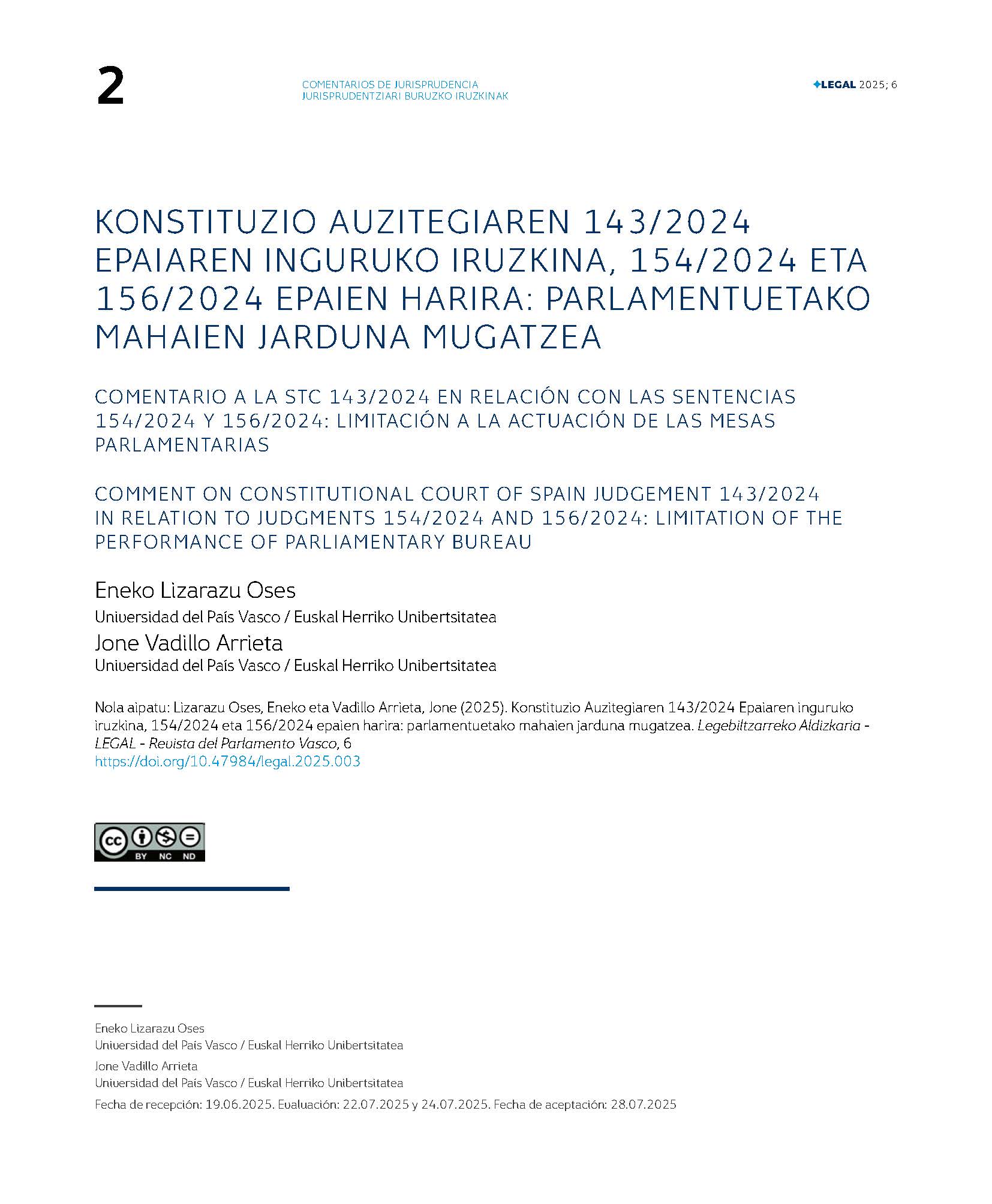Abstract
This commentary analyzes the ruling 143/2024 of the Constitutional Court, taking as reference also the subsequent judgments 154/2024 and 156/2024. The conflict which gave rise to these judgments is found in the agreement of the bureau of the Parliament of Catalonia authorizing the processing of a popular legislative initiative aimed at recognizing the independence of Catalonia. In the opinion of the appellants, the Bureau of the Chamber has an obligation not to admit to trial initiatives radically contrary to the Constitution, since that admittion does not only affect the fundamental rights of parliamentarians, but also legitimizes an initiative that is manifestly unconstitutional. Against this idea, the other side defends the legitimacy of such a decision, arguing that it is fundamental to defend the political debate, essential in a democratic state like Spain. However, through these rulings the Constitutional Court confirms its previously established jurisprudence: the parliamentary bureaux must not only control the form of initiatives, but also have an obligation to examine the unconstitutionality of their content. In the face of this trend, however, there are already views that advocate political debate and pluralism. Moreover, while constitutional control is necessary, it must have clear limits, in order to ensure a healthy democracy. Therefore, this paper also briefly reflects on the balance between the fundamental political debate in parliaments and the constitutional control exercised by the Constitutional Court in the legislative chambers.
References
Arbós i Marín, Xavier (2016). El Tribunal Constitucional como facilitador: el caso de la Sentencia 42/2014. La última jurisprudencia relativa al Parlamento: 2016ko urtarrilaren 27an eta 28an Vitoria-Gasteizen egindako mintegia (21-55 or.). Vitoria-Gasteiz: Eusko Legebiltzarra. https://www.legebiltzarra.eus/ic2/restAPI/pvgune_descargar/default/a3bb9d00-27d3-425f-ad10-e8efc3cc1fdd
Gómez Corona, Esperanza (2021). Los límites de la autonomía parlamentaria hoy. La influencia del conflicto catalán sobre el control de los actos parlamentarios sin valor de ley por el Tribunal Constitucional. Teoría y Realidad Constitucional, 47, 237-261. https://doi.org/10.5944/trc.47.2021.30717
Lasagabaster Herrarte, Iñaki (2022). El Tribunal Constitucional y las Cámaras Legislativas: una reflexión al hilo de la STC de 28 de octubre de 2021. Administrazio Publikoaren Euskal Aldizkaria, 124, 157-195. https://doi.org/10.47623/ivap-rvap.124.2022.04
López de Lerma Galán, Jesús (2021). El control de la actividad parlamentaria como garantía del sistema constitucional. Estudios de Deusto, 69 (1), 49-79. https://doi.org/10.18543/ed-69(1)-2021pp95-125
López Guerra, Luis María eta Espín Templado, Eduardo (zuz.) (2022). Manual de Derecho Constitucional. Volumen II. La organización de los poderes Estado y Comunidades Autónomas. Valencia: Tirant lo Blanch.
Ortega Santiago, Carlos (2024). Las funciones de la mesa del parlamento y su control jurisdiccional por el Tribunal Constitucional. Última jurisprudencia del Tribunal Constitucional en materia parlamentaria: 2024ko urtarrilaren 22an eta 23an Vitoria- Gasteizen egindako mintegia (163-200 or.). Vitoria-Gasteiz: Eusko Legebiltzarra. https://www.legebiltzarra.eus/ic2/restAPI/pvgune_descargar/default/14fe0fb2-ff01-4665-9c5c-ece87fe7b91a
Recoder Vallina, Tatiana (2022). El deber de cumplir los pronunciamientos del Tribunal Constitucional por las Mesas del Parlamento en sus facultades de calificación de las iniciativas parlamentarias: Comentario a la Sentencia del Tribunal Constitucional 24/2022, de 23 de febrero. Recurso de amparo núm. 4427-2020. (BOE núm. 72, de 25 de marzo de 2022). Revista de las Cortes Generales, 112, 473-482. https://doi.org/10.33426/rcg/2022/112/1652
Ridao Martín, Joan (2023). El control constitucional del Parlamento y la juridificación de la vida política. Revista de Derecho Político, 117, 73-98. https://doi.org/10.5944/rdp.117.2023.37921

This work is licensed under a Creative Commons Attribution-NonCommercial-NoDerivatives 4.0 International License.
Copyright (c) 2025 Eneko Lizarazu Oses, Jone Vadillo Arrieta

